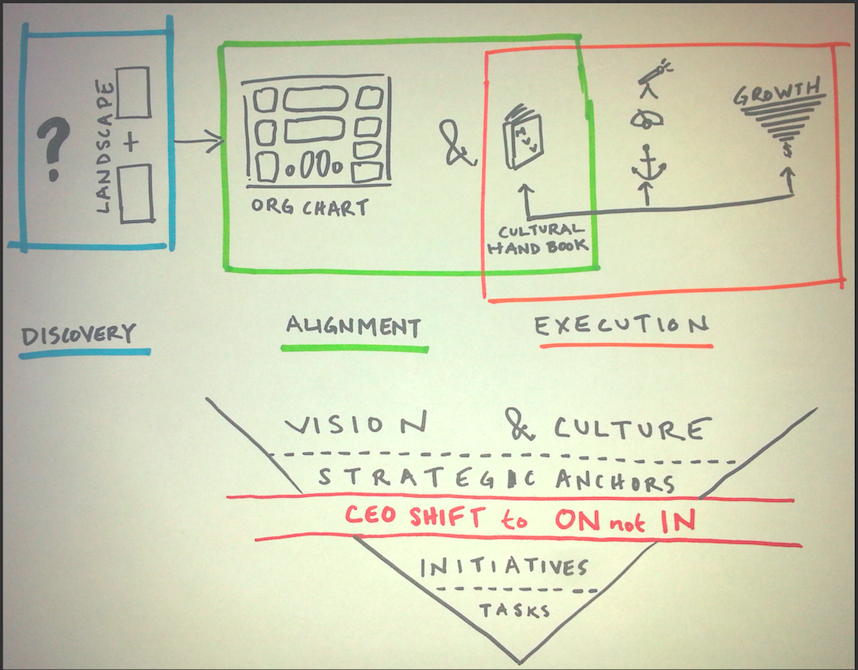 Traditional/Centralized forms of church government destroy a church's mission. At Kaleo Church we continue to re-think the form of our church and our church's ecclesiology for the sake of the gospel. As we do, we must also consider how we ought to lead, in light of a move from being a 'traditional, Constantinian Church' to a church designed to transform San Diego.
Traditional/Centralized forms of church government destroy a church's mission. At Kaleo Church we continue to re-think the form of our church and our church's ecclesiology for the sake of the gospel. As we do, we must also consider how we ought to lead, in light of a move from being a 'traditional, Constantinian Church' to a church designed to transform San Diego.
First, here are the reasons why we must re-consider traditional 'CEO' mentality churches shaped by Western ideas. As a note this includes both CEO/Sr. Pastor churches as well as those who lead as a plurality of elders. Traditional/Central led churches will… (see Traditional Church Leadership diagram)
1. be limited by it's leadership to be on mission. This is because of the top down leadership which is a vote/control/power position. The church creates a bottleneck where all decisions must go to the center to be processed by the few in order for action to take place. The church will be limited by the leaders ability to make timely decisions on a frequent basis. The overall organization is limited in scope based on what the leaders can support.
2. significantly impair discipleship of their people. The church creates a substantial 'pastor/leader' and 'laity' distinction where the people are trained to function as second-tier Christians. Knowledge is centralized rather than teaching and sending people to make decisions and apply the gospel to diff't situations. For example, one local church I know of would not let several young men who were passionate about starting a college ministry do so, because they were not seminary trained. This church may be a great 'teaching' church but their people will not be discipled to apply this knowledge on mission to change their city.
3. have natural resistance to reach the margins of society. Being the beautiful mess taxes the leadership because they will take on the counseling load or other challenges brought on by being missional. It is easier to create a great family atmosphere where everyone is ok than invite broken people into the Kingdom.
4. cultivate consumeristic programs rather than equip people for transformation. Ministry must be program driven because Christians are not freed to apply the gospel to transform the city. Programs can only deal with problems, people on mission can transform a city.
Side Note on Plurality of Elders: I believe there is rock-solid Biblical case for the plurality of elders. (Suggested Reading: Biblical Eldership: An Urgent Call to Restore Biblical Church Leadership
) I don't see how a Sr. Pastor led church can ever overcome the above problems (much less the below suggestions), unless the church functions as a plurality of elders. Elders have the privilege of being the under-shepherds of the church. (Jesus it the one true shepherd.) For some, this role of shepherding creates a picture of sitting around 'watching the flock' only. The elder should be responsible for leading the flock on mission, teaching them theology to deal with the paths difficulties and praying, counseling, watching out for those who are having troubles. But all of this is done with the emphasis on mission.
 What does it look like to have a decentralized plurality of elders leading a triperspectival church? How can we raise the bar of discipleship and create a sent people who are adaptive and on mission to transform a community? Here are a few thoughts: (see Leading as a Missional Eldership diagram )
What does it look like to have a decentralized plurality of elders leading a triperspectival church? How can we raise the bar of discipleship and create a sent people who are adaptive and on mission to transform a community? Here are a few thoughts: (see Leading as a Missional Eldership diagram )
The leadership needs to view the church triperspectivally, meaning the church is a Cause (Normative), Community (Existential) and Corporation (Situational). It is in this way the eldership will make decisions that are centralized, de-centralized and delegated to people on mission. These are how these decisions might be made:
Corporation: Elders should make central decisions about issues of doctrine, vision and values. It is critical they are united in their stand on principle issues of doctrine/theology. This is like Paul gathering with other early church leaders in Galatians to ensure there was unity on the gospel. Central decision making on vision and values will be heavily influenced by the elders involvement in the body and the goal is to install elders who have been raised up in the church and confirmed they understand the churches vision/values.
Community: Elders should delegate and disciple the community to handle the bulk of the counseling, gospeling of believers and the function of mission. If a community comes to a problem they can't handle, they can involve a community leader and escalate it up to the Missional Community Leader and eventually to an elder. The goal is to push the active life of the church into the community. This is like Jethro's counsel to Moses but also viewed in NT church life.
Cause: Particular elders (or leaders such as deacons) will lead people out on mission on causes. These leaders may be particularly acute at mercy ministry, evangelism, apologetics, teaching, etc. These leaders should be actively creating disciples in a systemic leadership development process so that decisions are made at the fringe of the community as those involved in a cause encounter difficulty. It is only when the run into problems that they cannot handle or that impacts the entire corporation that they escalate problems inward.
The goal of all of this is to create a highly adaptable church body that provides flexible leadership decision-making at the appropriate level and creates a culture of people on mission. This certainly is going to require great trust and a willingness to let people fail. It also will require letting go of some of the control and trusting that the Holy Spirit that is in the leadership is also in the entire church body.
CREDITS: A lot of this is triggered by Hirsch's The Forgotten Ways and The Missional Leader: Equipping Your Church to Reach a Changing World by Alan Roxburgh and Fred Romanuk as well as conversations with David Fairchild & Harbor Presbyterian.


